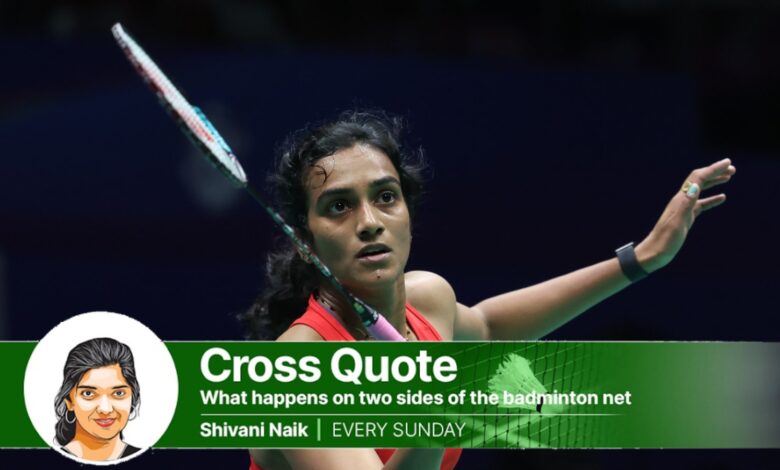Why female champs should be unapologetic about earning lots of money winning at sport | Badminton News

Not any righteous design or activism, but sheer work rate and skill, female doubles shuttlers from Indonesia, Korea and China, for years, topped the annual year-end match earnings in badminton. They often played mixed doubles and womens doubles at a very high level week in, week out, and pay parity between men and women was always a thing in this sport with its Asian and European adminrators having long accepted equal wages for equal labour on court.
These were not mammoth figures, just a fraction of what tennis’ Grand Slam finals might’ve been making, or even what the womens golf tour or Indian cricket now offers its women. But in badminton’s limited universe of equality, women were not to be denied a fair chance to play, win and earn.
Story continues below this ad
The scope for improvement is immense – the whole sport needs marketability and wooing of big brand sponsorships. The World Championships need to move towards becoming a richly paid gig eventually. But so do the Olympics, if they are to stay relevant for sports that consider the Games to be the pinnacle, and drop the pretense of values of amateurism enforced only on athletes, not the umbrella body. But these are battles that apply to both men and women, and not the latter solely.
Equal pay, equal visibility, equal opportunity to be the main act, and not the undercard for women – was something badminton knew innately. Alongside the fundamental truth – the best way to accord respect, honour, dignity to its female exemplars, and make the sport gleeful for them, was putting thick black markers with nice, chunky money amounts on giant cheques. BWF is notorious for delaying the actual cash transfers, and routing it via national federations which annoys Viktor Axelsen no end, but at least its women players know if they win, they can increase their bank balance.
Because these are largely Asian societies and earnings not so stratospheric, none of the top women’s shuttlers, have actually gone on to enter entrepreneurship post their playing days, like say, Serena Williams or Maria Sharapova. But there is immense curiosity over which way Carolina Marin, the original superstar of this golden generation, will head. One of the bravest competitors of the last decade, she gave it her everything after multiple knee surgeries and aimed for that second Olympic medal she wholly deserved, collapsing on court when leading in the semifinals. But in her prime, Marin opened up some avenues for European female shuttlers, with her natty endorsement deals.
She was the face of La Liga in the Spanish federation’s Asian outreach, and jogged attention of European corporations towards a non-traditional sport, carrying sponsorships for luxury watches, grocery and hotel chains, fashion brands and sports manufacturers. Her endorsement figures however were trumped PV Sindhu, who continues to strike big money deals even if her game is down a notch. The spread over the years is lavish – athleisure, sports gear, cosmetics, banks and fintech, e-commerce, real estate, car resales, womens hygiene – and plenty of pan-India billboard appearances. As India’s first double Olympics medall among women, Sindhu has played it smart and steady and maintained her brand value, making the token year-end top earners ls. Story continues below this ad
Ratchanok Intanon and Tai Tzu-ying are sporting successes and extremely well endorsed in their respective countries, well above their male counterparts. (AP/File)
She will continue to draw fire for her unsteady game till she nails another proper title. But her absolute flex in flying out to All England in a private jet, needs to be applauded. ‘Earn well, spend well’ ought to be aspirational for confident, independent, women, and not false humility and subservience when you have two Olympic medals – two more than any Indian men in her sport. It must be evident now that confident, self-assured women win at sport- be it Sania Mirza, Sindhu, Saina, Manu Bhaker, Mirabai Chanu, Sakshi Malik or Vinesh Phogat. Besides financial independence (and occasional ability to splurge), sporting success has given each of them a voice – if they choose to pick relevant battles. But without earning good money for winning at sport, there is no real women’s power. The sentiment to fight for what sportswomen deserve – scheduling primetimes, TV coverage, endorsement deals, awards like Khel Ratna or Padma, courtesy and respect and action against nasty online trolling – needs to be appreciated, not labelled ‘arrogant.’
Cheer on a woman who earns millions in one go, winning at elite sport – she’s no different from a banker, a female CEO, a canny stocks investor, a successful lawyer or surgeon or IT whiz. Respect her money as hard-earned, for sport is very difficult in India, and has seldom come from generational wealth or Ivy League seats abroad, more accessible to HNIs.
Globally, like in India, badminton’s popularity has risen because of the women in the last 10 years, though Susi Susanti set the base in Indonesia way back, ensuring equal attention and respect, just being her brilliant self. But nobody will deny that Marin will remain the spark for generations of European female shuttlers, not just Spaniards, and that Saina Nehwal took Indian badminton into a different orbit with her 10 Super Series titles and dedication that put shuttle on sports pages week in, week out.
Ratchanok Intanon and Tai Tzu-ying are sporting successes and extremely well endorsed in their respective countries, well above their male counterparts, and Japan’s fleet of women’s doubles shuttlers and Akane Yamaguchi and Nozomi Okuhara take some of the biggest paychecks from Japanese corporations. An Se-young has faced a torrid time with her federation, but the gold medal might just have earned her liberation from those strangleholds of authority. She will continue to push herself – in order to give her parents and herself a better life, and deserves all the financial rewards that go her way.Story continues below this ad
China, unofficially takes good care of financial well being of all its Olympic medalls, and London silver medall and serial winner between 2009 and 2015, Yihan Wang’s net worth in 2023 was measured at 5 million USD. Tokyo champ Chen Yufei, though might’ve earned something far more significant than money with her gold medal – the freedom to speak her mind, show her vulnerability, share her mental health brittleness, accept that after years of focussed training, the sport can get a tad boring and other interests need to be explored, and complete liberty to walk right back into the sport, once she’s had her fill of R&R.
Lin Dan’s net worth in 2023 was estimated at 26 million USD, after 2 Olympic gold and 6 World Championship medals. Both targets ought to be on any female shuttler’s radar.






